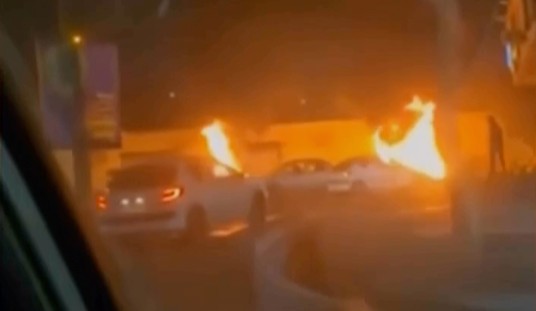“My first boyfriend was a Palestinian,” says Annette Bening, portraying a CIA operative enamored of revolutionaries in The Siege, a gripping 1998 movie about Palestinian terror in New York. “My father used to say they seduce you with their suffering.”
Alas, they seduce no more.
Images of destroyed Palestinian homes, masked men shooting guns in the air, and processions of mothers pledging more children to martyrdom draw yawns, or anger.
When Hamas bulldozed Egypt’s borders, unleashing a flood of half a million chaotically poring out into border towns and scooping up everything from kerosene to aspirin and eggs, the man-in-the-street reaction toward their Palestinian brethren was dismay at this primal attack. Hamas, in the chaos, shot nearly 50 Egyptian soldiers. Within days Egypt put taller and beefier walls back up, with foreign minister Ahmad Abulgheit vowing in a remarkable comment to “break the leg” of anyone illegally crossing. In 1970 King Hussein of Jordan unleashed his entire army onto Palestinian refugee camps in a yearlong civil war known as Black September. Last year in Lebanon the army fought Palestinians for four months in Tripoli, leveling their refugee camp of Nahr al Bared, where terrorists were domiciled.
Is the honeymoon over between Arab militancy and the Palestinian cause?
Almost. Unlike Palestinians, most Arabs have quantifiable dreams and recognizable social projects. Gulf folks are focused on getting seriously rich as their oil swoons over $100 a barrel, building mini-copies of the Louvre and Guggenheim museums alongside artificial ski slopes in their shopping malls and full branches of U.S. universities in their deserts. Poorer Arabs of the Levant or crowded populous lands with no oil such as Egypt, Morocco, and Yemen are trying to survive without Islamist coups. Regionally, concerns focus on the Iraq war, nascent Iranian hegemony, and the growing clashes of Muslims — Sunnis against Shiites.
Another part of the Palestinian predicament is the “Neverland” ordinary Palestinians are sinking into, venerating death cults as substitutes to social projects.
A grand illustration of the mindset came from Fawzi Barhoum, the chief Hamas spokesman. Standing amidst the rubble of bombed-out homes in Gaza the other day, he proudly declared Palestinians “have now gone from stone to rocket.” As he spoke he was blissfully unconscious of crated streets and the lunar landscape surrounding him, crisscrossed behind him by donkey carts that constitute public transport. More fitting would have been “from donkey to stone age.”
The Hamas-run republic of Gaza is a basket case. Jam-packed like a box of sardines with 1.5 million procreating at dizzying rates, it boasts the world’s highest population density. Half its people live below $2 a day. All are dependent upon the kindness of strangers, mostly the U.S. and the UN, which pour in millions of dollars daily along with tons of food and drugs. Israel supplies power and fuel.
In 2006 I published an open letter op-ed addressed to my Palestinian brethren, imploring them to declare defeat and save what’s left. Had they done so back in 1948 after their first “liberation war” against Israel they would have had their independent state.
Five wars later they live on a fraction of it. Glorious struggles are fine if they land someplace. But 60 years of highfalutin wars reduced that Palestinian homeland to a set of negative returns. If anything can still be carved out, it shall be far smaller. If truth were told, the deal Bill Clinton offered Yasir Arafat at that Wye Plantation in July 2000 after 20 days of exhausting mediation was startlingly generous, given the balance of power between Israelis and Palestinians.
It isn’t going to get better with or without rickety homemade missiles.
As of now, the only viable Palestinian state looks pretty much like Gaza plus some desert land surrounding it. The West Bank, which could have been part of it, is fast disappearing as slices of salami allocated to Jewish settlements. Counting upon the world, including the Arabs, to be shaken by the injustice of it all is part of that Palestinian illusive Neverland.
Israelis will stop only if they have a deal parallel to the one they are creating on the ground. Time is of the essence. Until then, Palestinian institutions, youth, economy, and indeed sanity will continue in free fall.
Palestinian brothers: you are down and out, alone in a burnt-out landscape shrinking by the day. The question is: why?
Youssef M. Ibrahim, a former Middle East correspondent for the New York Times and Energy Editor of the Wall Street Journal, is a freelance writer and Mideast political risk consultant based in New York.









Join the conversation as a VIP Member